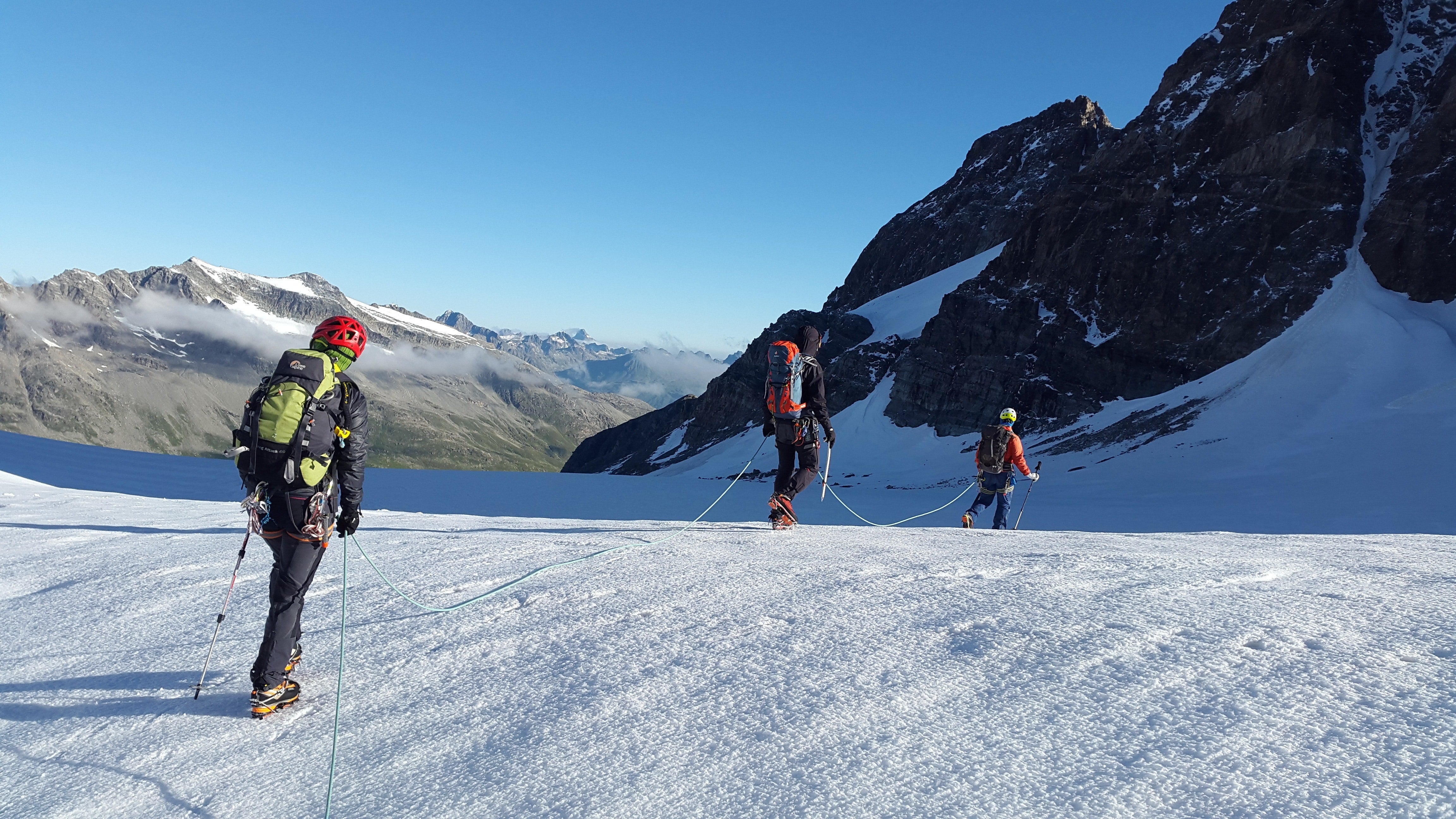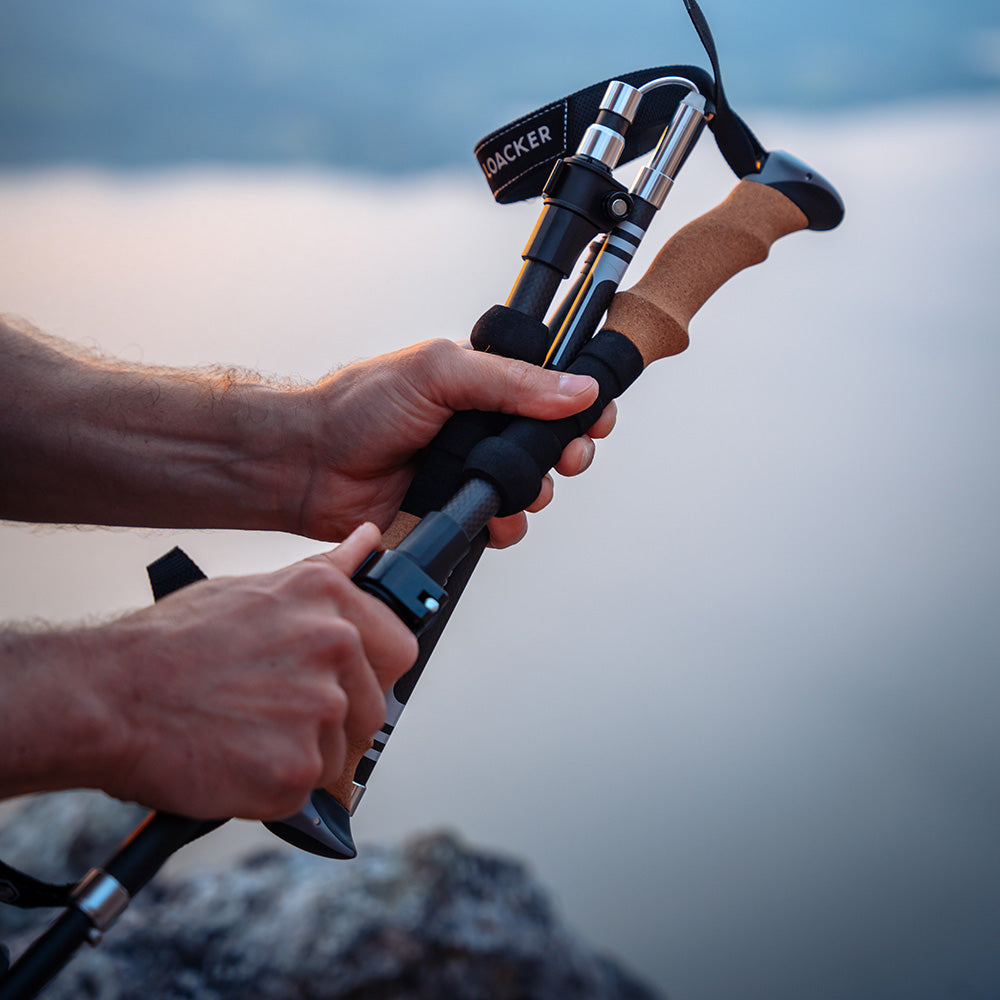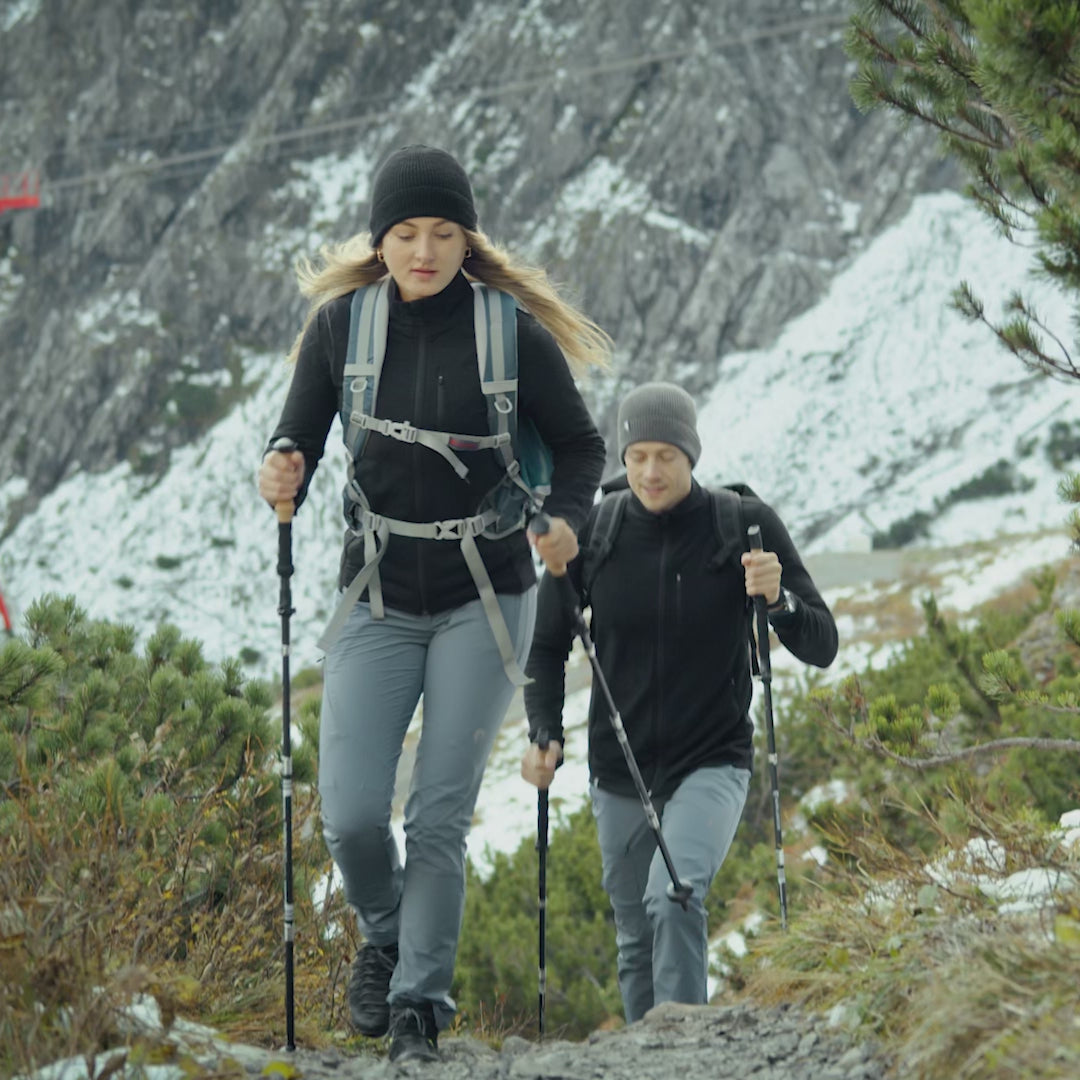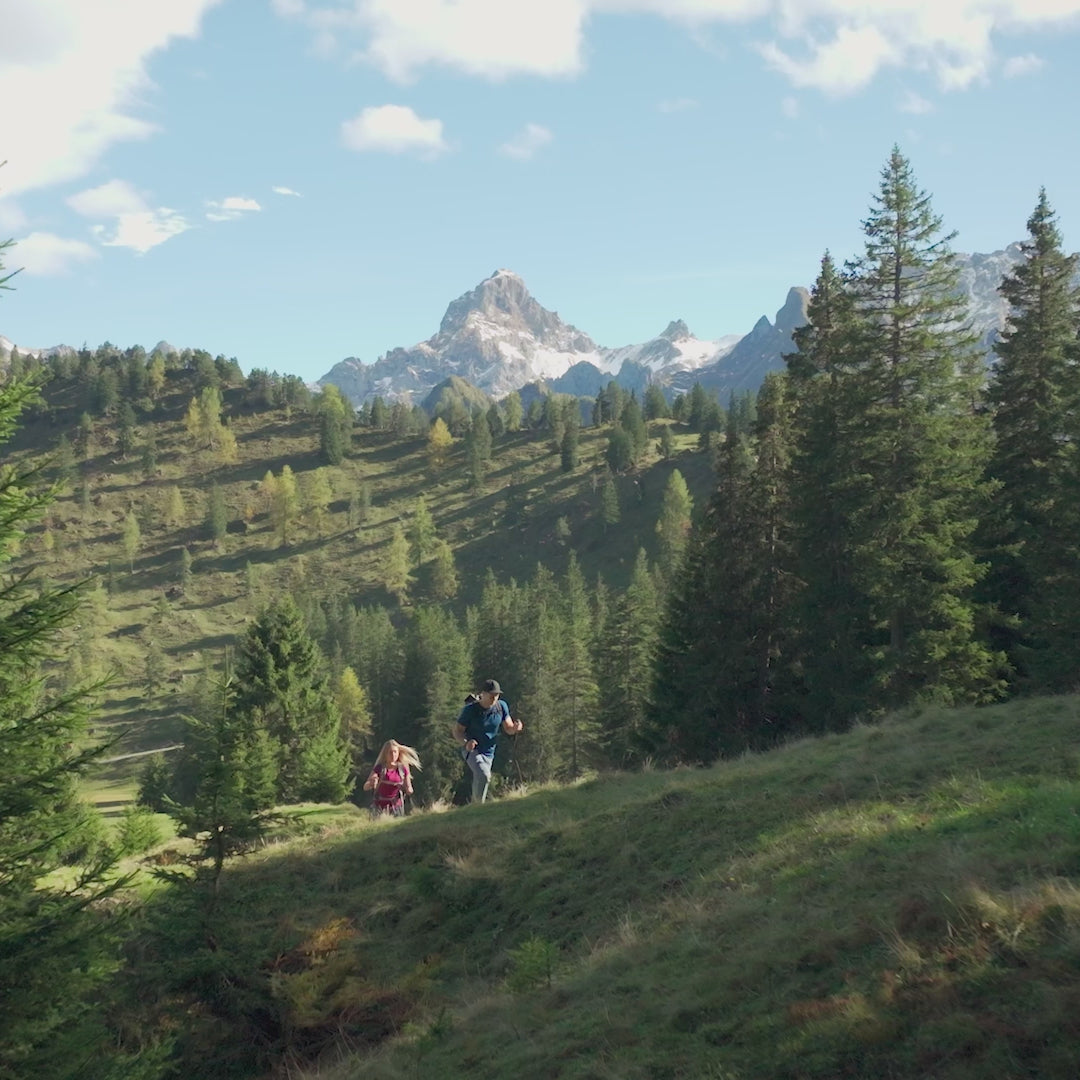25. Januar 2023
Erreichung neuer Höhen: Wandern in Garmisch rund um und auf die Zugspitze
Teil 1 unserer neuen Outdoor-Blog-Serie 'Die schönsten Wanderungen'

Die Region um die Zugspitze bietet das ganze Jahr über eine Vielzahl von Wandermöglichkeiten mit unterschiedlichen Schwierigkeitsgraden durch wilde und unberührte Landschaften.
Was gibt es Schöneres, als die Tage zu nutzen, um die Natur zu erkunden und die Schönheit der Berge zu genießen? Wir haben uns entschlossen, eine neue Outdoor-Blog-Serie zu starten, in der wir euch die schönsten Wanderungen in Deutschland, Österreich und der Schweiz vorstellen werden. In unseren Outdoor Blog Beiträgen werden wir euch Informationen über die verschiedenen Wanderwege, die Aussicht, die Schwierigkeitsgrade und alles, was man für eine erfolgreiche Wanderung braucht erörtern. Freut euch auf atemberaubende Landschaften und lasst euch inspirieren. Folge uns auf alpinloacker.com oder melde dich für unseren Newsletter an, um keine der kommenden Blog-Posts zu verpassen.
Den Anfang machen wir im bayerischen Garmisch-Partenkirchen. Die Zugspitzregion mit Deutschlands höchstem Berg ist ein Erlebnis für die Sinne und verfügt über 300 Kilometer Wanderwege. Mit nur circa einer Fahrstunde von München entfernt ist es ein beliebtes Reiseziel im Dreiländereck und ebenso gut erreichbar mit Bus oder Bahn. Ob erfahrener Bergsteiger, Kletterhang-Liebhaber, Familienausflug oder Trailrunning, in der Bergwelt rund um Garmisch-Partenkirchen findet jeder eine Wanderung nach seinem Geschmack. Die Zugspitze mit 2.962m ist ein Muss für jeden Gipfelstürmer und mit ein paar Tipps und Tricks auch für Anfänger zu schaffen. Wer nur die atemberaubende Aussicht genießen will, lässt sich von der Zugspitzbahn hoch fahren. Da es in der Umgebung der Zugspitze keine Berge von vergleichbarer Höhe gibt, hast du die Möglichkeit vier Länder von dort aus zu entdecken: Deutschland, Italien, Österreich, und die Schweiz. Einige der auffälligsten Gipfel in der Nähe sind der Großglockner mit 3.798 Metern, die Wildspitze mit 3.768 Metern, der Ortler mit 3.905 Metern und der Piz Bernina mit 4.049 Metern.

Die Zugspitze selber ist mit 2.962m Deutschlands höchster Berg und setzt eine gewisse Erfahrung, sowie Trittsicherheit voraus.
Leichte Wanderwege mit tollen Aussichten für die ganze Familie
Eine besonders beliebte Wahl für Anfänger und Familien sind die vielen, leichten Wanderungen in der Region. Ein Highlight ist definitiv die Besteigung des Wank Berges (Höhenmeter: ca. 1100 hm - Auf- & Abstieg). Er bietet eine atemberaubende Aussicht auf die Bergketten und Zugspitze, sowie auf die berühmte Olympia-Skisprungschanze. Einkehren lässt sich wunderbar in der Sonnenalm oder im Wankhaus. Der Aufstieg kann teils etwas anstrengend sein - hier können Wanderstöcke Abhilfe schaffen. Die Route lässt sich dank der Mittelstationen ebenso je nach Belieben abkürzen. Für die ganz Kleinen eignet es sich, die Wankbahn hochzunehmen und gemütlich runter zu wandern.
Ein ebenso beliebtes Ziel für leichte Wanderungen in Garmisch ist der Eibsee - ein malerischer See mit herrlicher Aussicht auf die Zugspitze. Die perfekte Rundwanderung inklusive Badespaß im Frühling, Sommer und Herbst. Im Winter ist die Schlittenwanderung rund um den See bei Familien sehr beliebt - jedoch kann es teilweise zu vereisten Abschnitten kommen. Hier empfehlen sich Gamaschen und Grödel, welche vor nassen Socken und Ausrutschen schützen.
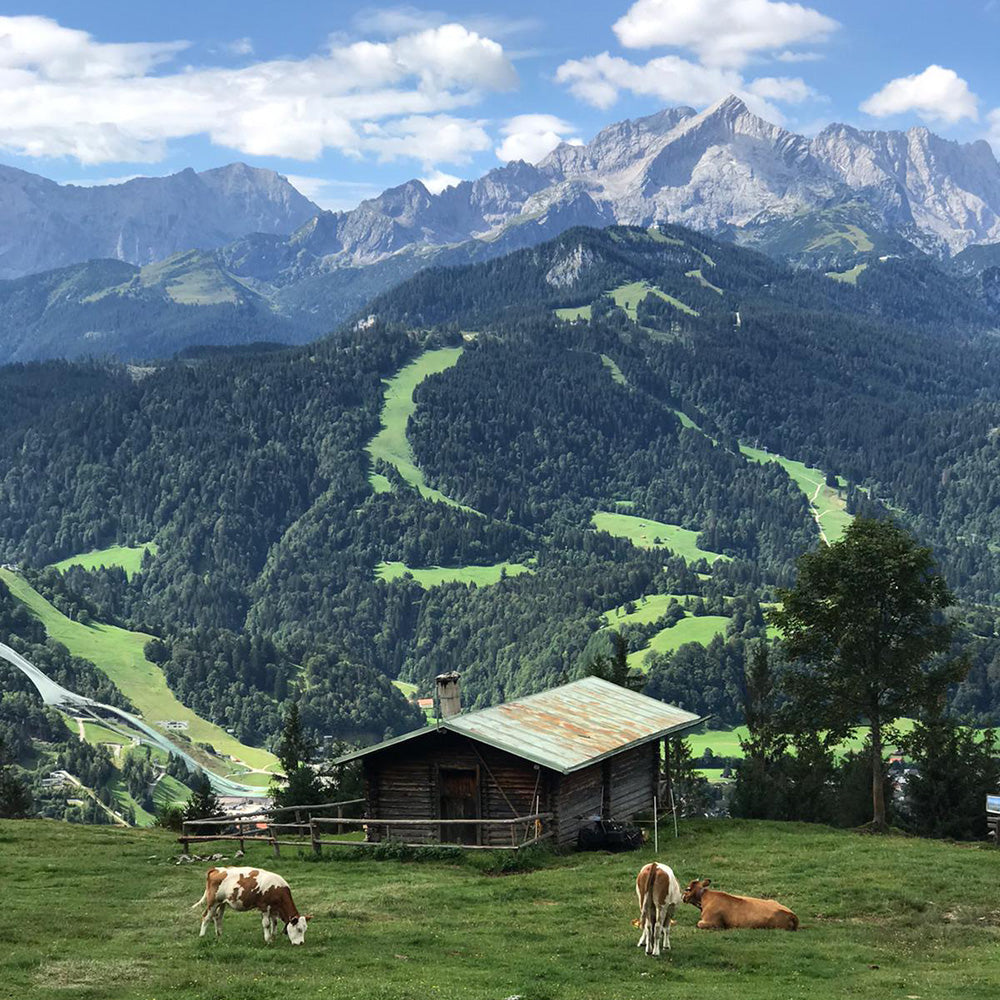
Vom Wank Berg aus hat man nach einer leichten Wanderung einen wunderschönen Ausblick auf die Zugspitz Region und die Olympia Sprungschanze
Ein weiteres Highlight ist ein Besuch der Partnachklamm. Eine beeindruckende Schlucht mit rauschendem Gebirgsbach und spektakulären Felsformationen. Der Weg durch die Klamm ist gut ausgebaut und führt durch enge Passagen und über Holzbrücken. Die Wanderung zur Partnachklamm beginnt am Olympiastadion und verläuft entlang des Flusses Partnach bis zur Talstation der Graseck-Seilbahn. Ein asphaltierter Pfad führt dann weiter zum Eingang der Klamm und entlang des Flusses über Brücken, Tunnel und Galerien mit beeindruckenden Aussichten in die tief eingeschnittene Schlucht. Am Ende der Klamm öffnet sich der Partnachfluss zu einem breiten Tal, das zum Spielen und Entspannen einlädt. Da es an einigen Stellen recht feucht werden kann und viele Pfützen vorhanden sind, sind Regenjacke und Regen Gamaschen empfehlenswert für diese Strecke.
Ein abwechslungsreicher Rückweg führt über Graseck. Weiter geht es über steile Serpentinen entlang der Fahrstraße bis Wildenau, zurück zum Ausgangspunkt beim Olympiastadion. Die Partnachklamm ist das ganze Jahr über geöffnet (das Ticket kann man vor Ort oder online lösen). Im Winter kann man die bizarre Schönheit von Eis und Schnee bewundern. Der Weg ist gesäumt von Eiszapfen, die an manchen Stellen sogar zu beeindruckenden Vorhängen gefroren sind. Das kristallklare Wasser des Flusses erscheint besonders blau und es entsteht ein besonderes Flair für eine eindrucksvolle Erfahrung. In der kalten Jahreszeit empfehlen sich aber unbedingt leichte Steigeisen für Wanderschuhe, um die Rutschgefahr zu vermindern. Ebenso ist es eindeutig kühler und Thermobekleidung, wie zum Beispiel Merino Unterwäsche ist empfehlenswert.
Für die erfahrenen Wanderer ist die Partnach der Start für die klassische Route auf die Zugspitze, die 1820 der Erstbesteiger Josef Naus genommen hatte. Hier wanderst du über die Bockhütte, die Reintalangerhütte und die Knorrhütte bis hinauf zum Zugspitzplatt und dann zum Gipfel.

Mystische Wege mit einer Länge von 699 Metern und einer Tiefe von etwa 80 Metern bietet die Partnachklamm.

Der Eibsee bietet nicht nur Abkühlung nach einer langen Wanderung im Sommer, sondern auch eine atemberaubende Kulisse.
Für Gipfelstürmer
Ein Muss ist natürlich die berühmte Zugspitze: Die Hochsaison für eine Besteigung ist im Sommer von Juni bis September. Vorsicht: Im Früh- und Spätsommer kann es auch noch in höheren Lagen schneien - Thermobekleidung ist bei ständigem Temperaturwechsel hier unbedingt nötig. Manche Routen – etwa durch das Höllental – werden deutlich heikler, daher ist die richtige Wanderausrüstung ebenfalls extrem von Bedeutung! Hier haben wir 4 Routen aufgelistet, die zur Zugspitze führen. Mit der Zugspitzbahn kommt jeder in sieben Minuten hoch. Wer zu Fuß aufsteigt, braucht hingegen sieben bis acht Stunden. Eine Besteigung der Zugspitze ist konditionell anspruchsvoll, aber technisch gut machbar – sofern man den richtigen Weg wählt, die richtige Wander Kleidung trägt und sich mit einem guten Trinksystem ausgestattet hat. Teleskop- oder faltbare Wanderstöcke kommen hier perfekt zum Einsatz und schützen Gelenke wie Muskeln. An matschigen und eisigen Stellen helfen Leichtsteigeisen und Gamaschen. Der ständige Temperaturwechsel setzt gute Wanderbekleidung voraus - hier empfehlen sich Merino Midlayer und Merino Unterwäsche sowie isolierende Jacken und Regenschutz.
1. Die Reintal-Route ist ein einfacher Weg, der von Garmisch-Partenkirchen aus durch die Partnachklamm über die Reintalangerhütte (1370 Meter) und Knorrhütte (2052 Meter) zur Station "Sonnalpin" führt. Es besteht die Möglichkeit, den Weg mit der Bergbahn abzukürzen. Übernachtungen auf diversen Hütten sind möglich, jedoch sollte man sich vorher über die Kapazitäten informieren.
2. Die Höllental-Route ist die anspruchsvollste zum Gipfel - sie verläuft über die Höllentalangerhütte (1387 Meter), die einen Gletscher und einen Klettersteig führt. Absolute Erfahrung im Alpin Sport und die richtige Outdoor Ausrüstung sind hier unbedingt notwendig, ebenso wie Schwindelfreiheit. Es besteht die Möglichkeit, eine geführte Tour mit erfahrenen Bergführern zu buchen.
3. Der Klettersteig "Stopselzieher" ist ein Klettersteig ab Wiener Neustädter und erfordert Trittsicherheit, Schwindelfreiheit, gute Kondition und gute Outdoor Ausrüstung. Dieser Anstieg ist anspruchsvoller als der Weg durchs Reintal und weniger spektakulär als die Route durchs Höllental. Hüttenübernachtungen sind möglich, jedoch sind oft eigene Schlafsäcke, wie zum Beispiel ein Hüttenschlafsack und Verpflegung erforderlich. Es empfiehlt sich, sich vorab beim DAV über die Regulierungen zu informieren.
4. Die Gatterl-Tour ist eine leichte Tagestour, die 16 km lang ist und über das Gatterl auf der Grenze zwischen Deutschland und Österreich führt. Sie ist eine der einfacheren Routen zur Zugspitze. Es ist jedoch wichtig zu beachten, dass man sich hier immer noch in hochalpinen Gebiet befindet. Es gibt auch die Möglichkeit, die Gletscherbahn vom Zugspitzplatt aus zum Gipfel zu nutzen. Der Weg führt über Geröll und Schneefelder, vorbei an den Diensthütten der bayerischen Zollwache, bis zur bewirtschafteten Knorrhütte. Ebenso Ist ein kleiner Klettersteig von ca. 100 Höhenmetern zu meistern, der jedoch sehr einfach und auch leicht ohne Sicherung begehbar ist.

Die Zugspitze - der höchste Berg Deutschlands und Erhebung mit dem nördlichsten Gletscher der Alpenregion.
Fazit
Die Liste an Wandertouren und unzähligen Möglichkeiten für jede Art von Bergsport rund um die Zugspitze, Garmisch, das Karwendelgebirge und die Alpenregion ist lang. Für die meisten war der erste Besuch in der 26.000 Einwohner Stadt sicher nicht der letzte. Da Garmisch zur Ferienzeit nicht nur Wanderer, sondern auch Skifahrer, Eisläufer und Radfahrer anlockt, empfiehlt sich die Anreise am besten in den ruhigen Monaten zwischen den Haupt-Saisonen. Eins ist jedenfalls sicher - In Garmisch kommen alle Bergfreunde auf ihre Kosten!
Ähnliche Blog Beiträge
Alles was du über Wanderstöcke wissen solltest
Wanderstöcke sind weitaus mehr als nur ein cooles Equipment. Sie bieten Dir zahlreiche Vorteile und lassen Deine Wanderung zum absoluten Highlight werden. Dennoch gibt es immer noch einige Vorurteile und Irrtümer.
Der folgende Blogbeitrag bringt Licht ins Dunkle. Erfahre:
- Welchen gesundheitlichen Nutzen Wanderstöcke haben
- Wie Du Trekkingstöcke benutzen kannst
- Welche Stöcke am besten zu Dir passen
- Wie Du die Stöcke einstellst
- Welche Transportmöglichkeiten es gibt
- Woran Du gute Wanderstöcke erkennst
Du bist eher der Video-Typ? Kein Problem, in unserer Kaufberatung gehen wir detailliert auf das Thema ein
Video-Beratung Wanderstöcke » So findest Du die richtigen Wanderstöcke
Warum sind Wanderstöcke sinnvoll?
Du hast dich sicherlich schon oft gefragt: “Wann sind Trekkingstöcke überhaupt sinnvoll?“ Weshalb jemand Wanderstöcke benutzt, kann sehr unterschiedliche Gründe haben. Prinzipiell haben Wanderstöcke viele positive Eigenschaften und Vorteile:
1. Unterstützung der Gelenke
Wanderstöcke wirken entlastend für
- Füße,
- Beine,
- Knie
- und Rücken.
Besonders beim Bergabgehen werden die Knie sehr stark belastet. Durch den Einsatz Deiner Bergsteiger Stöcke sparst Du Energie, Deine Konzentration lässt nicht so schnell nach, und Du bist sicherer beim Abstieg.

2. Gleichgewicht
Die meisten Unfälle beim Wandern passieren durch Rutschen oder Stolpern. Wenn Du zusätzlich müde bist, Deine Konzentration nachlässt, ist die Gefahr eines Sturzes noch einmal wesentlich größer.
Die Wanderstöcke sind wie Verlängerungen Deiner Arme, die Dich stützen und Dir einen besseren Halt geben. Du hast dadurch zusätzliche Stabilität und verbesserst deinen Gleichgewichtssinn.
3. Körperhaltung und Atmung
Wanderer, die Trekkingstöcke benutzen, können gleichzeitig ihre Körperhaltung verbessern. Wenn Du einen schweren Outdoor Rucksack auf dem Rücken trägst, unterstützen die Stöcke Deine aufrechte Haltung. Dabei wird deine Wirbelsäule bestmöglich entlastet.
Wanderstöcke provozieren nämlich den Gang in aufrechter Haltung. Es ist fast unmöglich, mit Wanderstöcken nicht aufrecht zu gehen.
- Deine Schultern können vorn nicht ‘zusammenklappen’.
- Zusätzlich wird durch die aufrechte Haltung die Atmung gefördert. Du bekommst leichter Luft.
Expertentipp: Eine bewusste Atmung ist bei Ausdauersport essenziell, damit Du Dich länger konzentrieren kannst, Du nicht so schnell ermüdest und somit unfallfrei bleibst.
4. Sicherheit
Wie du aus den vorigen Punkten herauslesen kannst, helfen Dir die Wanderstöcke in vielerlei Hinsicht. Du bleibst länger unfallfrei, indem Du
- Deine Gelenke unterstützt,
- Dein Gleichgewicht förderst,
- Deine Haltung nicht zusätzlich strapazierst, sondern eine gesunde Körperhaltung förderst.
Generell wirkt diese Gehhilfe positiv auf deinen Energiehaushalt, somit kannst du beim Bergwandern mit Stöcken das Laufen richtig genießen.
5. Nordic Walking
Die schwungvolle Bewegung beim Nordic Walking
- beansprucht Herz und Kreislauf,
- regt den Stoffwechsel an,
- stärkt Muskeln und Knochen
- und rückt überschüssigen Pfunden zu Leibe.
Wer die Bergsteiger Stöcke fleißig vor und zurückschwingt, kräftigt zudem Arme, Schultern und Rücken.

Schritt-für-Schritt-Anleitung: Wanderstöcke richtig einstellen

Schritt 1: Die richtigen Wanderstöcke auswählen
Bevor du die Wanderstöcke einstellst, ist es wichtig, dass Du das richtige Modell für deine Bedürfnisse auswählst. Achte auf die Länge, das Material und die Griffe der Stöcke, um sicherzustellen, dass sie zu Deiner Körpergröße und Deinem Wanderstil passen.

Schritt 2: Die optimale Länge bestimmen
Die Wanderstöcke sollten dem Gelände angepasst werden. Beim Abstieg sollten die Stöcke etwas länger und beim Aufstieg etwas kürzer eingestellt werden. In der Regel aber sollten die Bergsteiger Stöcke so lang eingestellt werden,
- dass die Hand den Griff leicht greifen kann,
- während der Arm im rechten Winkel zum Boden steht.
- Der Unterarm ist parallel zum Boden und am Ellbogen gebeugt.
Welche Wanderstöcke bei welcher Körpergröße?
Viele Unternehmen bieten Richtlinien für die richtige Länge für die Körpergröße an. Es kann jedoch sehr individuell sein, wie ein Stock eingestellt wird. Wichtig ist, wie oben beschrieben, dass die Grundeinstellung in einem rechten Winkel erfolgt.
Wie lang sollten Nordic Walking Stöcke sein?
Da diese Frage oft speziell auch für Nordic Walking Stöcke auftaucht, behandeln wir diese Frage hier gesondert.
- Der Abstand zwischen Stock und Körper sollte circa eine halbe Armlänge betragen.
- Wenn Dein Arm in einem 90 Grad Winkel gebeugt ist, sollten die Stöcke an Deinen Unterarmen enden.
- Das 90 Grad Prinzip ist also genau gleich wie bei herkömmlichen “Trekkingstöcken”.
- Zusätzlich gibt es die Methode für die Berechnung der Länge. Dafür multiplizierst Du Deine Körpergröße in Zentimeter mit 0,7. Das Ergebnis ist die Stocklänge.

Schritt 3: Wanderstöcke Höhe einstellen
Suche nach dem Verstellmechanismus an deinen Wanderstöcken. Dies kann ein Drehverschluss, ein Klappsystem oder ein Schnappverschluss sein. Löse den Verschluss, um die Stöcke zu verstellen. Ziehe oder schiebe die Teleskopstangen, um die gewünschte Höhe einzustellen. Achte darauf, dass die Markierungen an den Teilen übereinstimmen, um sicherzustellen, dass beide Stöcke gleich hoch eingestellt sind.

Schritt 4: Die Handschlaufen einstellen
Wanderstöcke sind normalerweise mit Handschlaufen ausgestattet, die es dir ermöglichen, die Stöcke ohne festes Greifen zu halten. Schlüpfe mit Deiner Hand durch die Schlaufe und passe die Größe der Schlaufe so an, dass sie bequem sitzt. Du solltest die Schlaufe so einstellen, dass du leicht in sie hinein- und herausrutschen kannst, ohne dass sie zu locker oder zu eng sitzt.

Schritt 5: Die Spitzen überprüfen
Überprüfe die Spitzen deiner Wanderstöcke, um sicherzustellen, dass sie intakt und scharf genug sind, um guten Halt auf verschiedenen Oberflächen zu bieten. Bei Bedarf kannst Du die Spitzen austauschen oder abgenutzte Spitzen ersetzen.
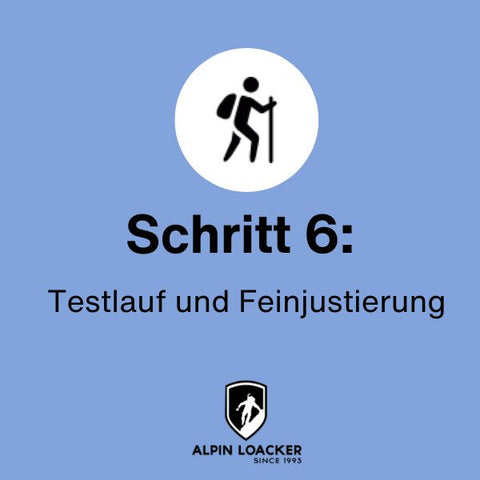
Schritt 6: Testlauf und Feinjustierung
Bevor Du mit den eingestellten Wanderstöcken auf eine längere Wanderung gehst, mache einen kurzen Testlauf. Gehe ein paar Schritte und überprüfe, ob die Länge und die Einstellungen bequem sind und sich gut anfühlen. Passe die Einstellungen bei Bedarf an, um das optimale Wandererlebnis zu erreichen.
Wie geht man richtig mit Wanderstöcken?
Beim Wandern laufen wir oftmals einfach los, ohne uns Gedanken über unsere Gehtechnik zu machen. Dies ist auch nicht verwunderlich. Schließlich ist unser Laufen automatisiert.
Wenn Du jedoch das volle Potenzial Deiner Trekkingstöcke nutzen möchtest, solltest Du beim Einsatz einige Punkte beachten:
1. Größe richtig einstellen
Zuallererst stellst Du Deine Wanderstöcke auf die richtige Größe ein. Siehe Punkt unsere Schritt-für Schritt Anleitung .
2. Griff richtig halten
Ein häufiger Fehler ist der falsche Griff, bei dem die Schlaufe oft einfach von oben eingefädelt wird. Richtigerweise solltest Du von unten durch die Schlaufe greifen, sodass man selbst mit geöffneter bzw. lockerer Hand Druck auf den Stock ausüben kann.
Dadurch kann man die Hände bei der Ausholbewegung öffnen, ohne auf die Entlastung zu verzichten.
Expertentipp: Damit die Hände nicht verkrampfen, solltest du bei der Ausholbewegung darauf achten, den Griff locker zu lassen.
Wichtig: Die Schlaufe sollte nur im relativen flachen Gelände benutzt werden. Wer stürzt und eingefädelt ist, kann nicht nach dem Griff greifen oder sich abstützen. Die Verletzungsgefahr ist dadurch um einiges höher.
3. Die richtige Körperhaltung
Um den bestmöglichen Effekt zu erzielen, ist es ratsam, die Stöcke immer nah am Körper zu führen. In flachem Gelände sind die Stöcke diagonal zu den Beinen und werden abwechselnd eingesetzt, entsprechend dem natürlichen Bewegungsmuster.
4. Im steilen Gelände gehen
In steilem Gelände ist der Doppelstockeinsatz die Variante, die Du anwenden solltest. Die Stöcke werden beim Auf- und Abstieg in der Regel bei jedem zweiten Schritt gesetzt und Du drückst Dich kraftvoll mit beiden Armen nach oben. So sind Stabilität und Entlastung gewährleistet.
5. Bergab gehen
Auch beim Bergabgehen ist die Doppelstocktechnik die beste Wahl. Du solltest die Stockspitzen nicht ins Gelände bohren, sondern den Griff so greifen bzw. halten, dass Du eine saubere Technik ausführen kannst. So rutschst Du nicht weg und vermeidest Stürze.
6. Querungen
Bei Querungen müssen Stöcke nicht zwingend anders eingestellt werden. Es reicht, wenn Du den bergseitigen Stock unterhalb des Griffes festhältst und talseits den Griff wie ein Knauf von oben umfasst.
7. Sehr steiles Gelände und Traversen
Sehr steiles Gelände und Traversen solltest Du uneingeschlauft passieren. Der Stock sollte hier ‘nur’ als Stütze verwendet werden. Es gibt auch die Möglichkeit, einen Stock mit beiden Händen zu umfassen.
"Das ist eine alte Methode, wie es die Bergsteiger damals gemacht haben. So Wolfgang Loacker, erfahrener Berg- und Skiführer im Montafon."
Steiles Gelände solltest Du aber prinzipiell nur begehen, wenn Du fit genug bist und Erfahrung hast, bzw. eine*n Expertin/Experten dabei hast.
Faltstöcke am Rucksack anbringen
Auf manchen Etappen oder in Bus und Bahn benötigst Du Deine Wanderstöcke nicht. Faltstöcke haben hier einen entscheidenden Vorteil.
Sie sind im Handumdrehen zusammengefaltet und aufgrund ihres geringen Packmaßes und Gewichtes ultraleicht zu transportieren. Das solltest du über den Transport deiner Wanderstöcke wissen:
Die Stöcke im Rucksack
Im besten Fall solltest Du außen am Rucksack keine Ausrüstung anbringen.
„Es ist sicherer, Trekkingstöcke im Rucksack aufzubewahren. Zum einen können sie leicht verloren gehen und wenn man stürzt, ist die Verletzungsgefahr höher", so Wolfgang Loacker, – österreichischer Berg- und Skiführer.
Außerdem wird das Bergwandern mit Stöcken, die am Wander Rucksack befestigt sind, schwieriger und gefährlich. Das Gewicht zieht nämlich nach hinten und nach unten. Das belastet deine Wirbelsäule und kostet Kraft.
Die Spitze am Rucksack
Die Befestigungsmöglichkeit hängt sehr stark von deinem Rucksack ab. Trekking- und Wanderrucksäcke haben in den meisten Fällen Schlaufen und Hacken, die es ermöglichen, die Stöcke einzustecken und einzufädeln.
Bei Schlaufen wird (die Spitze) unten hineingesteckt. Bei Stöcken ohne Teller findet die kleine Schlaufe Verwendung, bei Stöcken mit Tellern die große Schlaufe.
Die Teller verhindern üblicherweise ein Durchrutschen der Stockspitzen. Ansonsten kannst Du Stockteller auch mit wenigen Handgriffen herunterdrehen.
Kompressionsriemen
Kompressionsriemen sind Schlaufen größtenteils rechts oder links am Rucksack angebracht, die zugezogen werden können. Die Wanderstöcke werden sozusagen umschlossen und festgezogen. So schlenkern deine Stöcke nicht hin- und her und sitzen fest und sicher an deinem Rucksack.
Klett- und Kabelbinder
Eine Alternative sind externe Klettverschlüsse sowie Kabelbinder, um Wanderstöcke am Rucksack zu fixieren. Diese Methoden setzen voraus, dass Du am Rucksack schon ein vorhandenes System hast, an denen Du Deine externen Klett- oder Kabelbinder einfädeln kannst. Vor allem die Klettverschluss-Methode ist nur für den Transport geeignet.
Wie transportiere ich Wanderstöcke im Flugzeug?
Wander- oder Trekkingstöcke sind im Handgepäck nicht erlaubt. Das gilt auch für Teleskop Wanderstöcke, die sich zusammenschieben lassen. Grund hierfür ist, dass Wander- oder Trekkingstöcke an der Sicherheitskontrolle zu den gefährlichen Gegenständen gezählt werden, weil sie sich potenziell auch als Waffen verwenden lassen.
Wanderstöcke können nur im Aufgabegepäck mitgenommen werden. Klappbare- oder Teleskop-Wanderstöcke sind hier von Vorteil. Diese können einfach er im Koffer oder Rucksack verstaut werden. Es muss keine zusätzliche Gebühr bezahlt werden und der Koffer kann platzsparend gepackt werden.
Bei nicht faltbaren Stöcken muss eine zusätzliche Gebühr gezahlt werden, da es sich um Sperrgepäck handelt und diese Art von Stöcken nicht in den Koffer passt. Die einzige Ausnahme beim Handgepäck bilden Gehhilfen wie Krücken oder Gehstöcke, wenn diese aus einem medizinischen Grund notwendig sind.
Welche Spitze für welchen Untergrund?
Auf Deiner Tour wirst Du oftmals mit unterschiedlichen Untergründen konfrontiert. Deshalb sind im Lieferumfang unserer Wanderstöcke auch verschiedene Aufsätze enthalten.
- Für den Einsatz auf hartem Untergrund eignen sich vor allem Asphalt Aufsätze. Sie schützen die Metallspitze am Wanderstock vor unnötigem Abrieb.
- Für den Einsatz im Gebirge solltest Du Deine Stöcke ohne zusätzlichen Aufsatz verwenden.
- Es sei denn, Du wanderst über Geröll. Hier empfiehlt sich das Aufschrauben der Schlamm-Aufsätze. Sie verhindern ein Einsinken. Wie der Name schon vermuten lässt, kannst Du diese auch im Matsch, auf Erde und Sand einsetzen.
Die mitgelieferten Nordic-Walking Aufsätze erleichtern Dir das schnelle Gehen und Pushen Deine Geschwindigkeit.
Kann ich mit Wanderstöcken auch auf Schnee und Eis wandern?
Ja! Dank der mitgelieferten Schneeteller kannst du deine Wanderstöcke auch im Winter nutzen. Die Aufsätze sind optimal für den Einsatz auf Schnee geeignet. Wenn Du eisbedeckte Passagen überqueren möchtest, solltest Du die Spitze ganz ohne Aufsatz verwenden. So hast Du maximalen Halt.
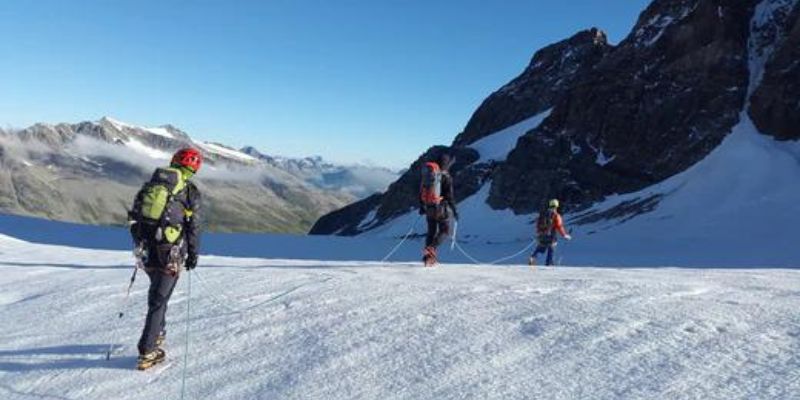
Fazit: Was sind gute Wanderstöcke?
Die eigenen Bedürfnisse stehen an erster Stelle. Dies ist der erste Anhaltspunkt, wie Du Deine Stöcke auswählen solltest, damit es ein „guter“ Stock für Dich wird. Körpergröße und Körpergewicht helfen Dir in diesem Punkt weiter. Bei guten Wanderstöcken sollte an zweiter Stelle immer das Preis-Leistungs-Verhältnis passen. Vergleichen und Erfahrungsberichte helfen hier weiter.
Wenn Du Dir nicht sicher bist, für welche Gelegenheiten Du die Stöcke überhaupt verwendest, ist es ratsam, nicht zu spezifisch einzukaufen. Sondern ein paar Stöcke, dass für mehrere Einsatzbereiche verwendet werden kann, zu erwerben.
Ansonsten gilt es, Stöcke nach dem Einsatzzweck auszuwählen. Wenn Du die Stöcke hauptsächlich für entspannte Wanderungen im Flachland benötigst, dürften Aluminium-Teleskopstöcke völlig reichen.
Möchtest Du allerdings auch Mehrtagestouren oder ins Gebirge, dann sind faltbare Aluminium- oder Carbonstöcke zu empfehlen. Es gibt keine eindeutige Antwort, was einen guten Wanderstock ausmacht und was nicht.
Bei falschem Einsatz und falscher Handhabung nützt Dir der teuerste und leichteste Carbonstock nichts mehr. Viel wichtiger ist es, sich mit dem Material auseinanderzusetzen und die eigenen Bedürfnisse zu kennen, um einen passenden Stock auszuwählen.
FAQ zum Thema Wanderstöcke:
Sollte ich feste oder teleskopierbare Wanderstöcke wählen?
Pauschal lässt sich diese Frage natürlich nicht beantworten. Der Einsatz der verschiedenen Modelle ist einerseits Geschmacksache. Andererseits hängt die Verwendung auch vom Einsatzgebiet ab. Wenn Du Wert auf ein geringes Gewicht und kleines Packmaß legst, solltest Du teleskopierbare Wanderstöcke auswählen.
Diese sind im Handumdrehen eingestellt und einsatzbereit. Legst Du hingegen Wert auf Steifigkeit und verlangst den Stöcken so einiges ab, dann sind feste Wanderstöcke besser geeignet.
Meine Wanderstöcke lassen sich nicht mehr feststellen: Was kann ich tun?
Wenn deine Wanderstöcke sich nicht mehr feststellen lassen, gibt es einige mögliche Lösungen, die du ausprobieren kannst:
Überprüfe die Verschlüsse: Stelle sicher, dass die Verschlüsse oder Klemmen der Wanderstöcke richtig geschlossen sind. Manchmal können sie sich versehentlich lösen oder nicht richtig arretieren.
Reinige die Stöcke: Schmutz, Sand oder Feuchtigkeit können die Mechanismen der Wanderstöcke beeinträchtigen. Reinige die Stöcke gründlich, um sicherzustellen, dass sie einwandfrei funktionieren.
Fette die Verschlüsse: Falls die Verschlüsse festgeklemmt sind oder sich schwer bewegen lassen, kannst du etwas Schmiermittel oder Silikonspray auf die Mechanismen auftragen, um sie wieder leichtgängig zu machen.
Wie reinige ich meine Wanderstöcke?
Bei sachgerechter Behandlung und der richtigen Pflege sind Wanderstöcke viele Jahre ein zuverlässiger Begleiter. Wenn Deine Wanderstöcke nass geworden sind, solltest Du sie auf die komplette Länge einstellen und mit einem sauberen Tuch abwischen. Dies gilt übrigens auch, wenn Deine Stöcke mit Dreck oder Staub in Berührung gekommen sind.
Vermeide dabei unbedingt, dass Schmutz in die einzelnen Segmente gelangt, da dies die Funktion beeinträchtigen kann. Solltest du deinen Wanderstöcken eine längere Pause gönnen, lagere sie unbedingt an einem trockenen und sauberen Ort. Ein feuchter Keller oder die Garage sind eher nicht geeignet.



